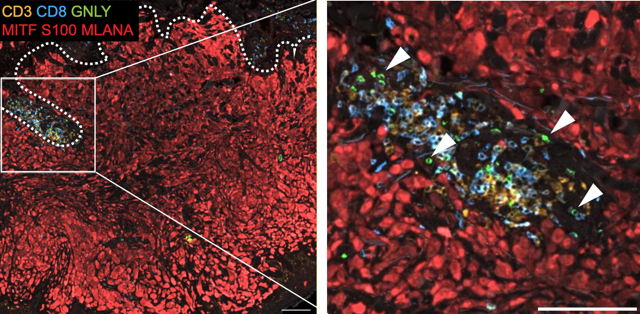Researchers uncover surprising role of 'natural killer' cells in resistance to cancer immunotherapy
Targeting NK cells could open the door to more effective immunotherapy in resistant tumors
Leuven, 18 June 2025 – Researchers at the VIB-KU Leuven Center for Cancer Biology have uncovered that ‘natural killer’ cells (NK), a type of immune cell, may actually be hindering the immune system’s ability to attack tumors in patients who don’t respond to immune checkpoint blockade therapies (ICB), a form of immune therapy. The findings of the study have been published in Cancer Discovery, a journal of the American Association for Cancer Research.
Melanoma, one of the deadliest forms of skin cancer, affects an estimated 330,000 people worldwide each year and causes nearly 60,000 deaths annually. While early-stage melanoma is one of the most curable cancers, later-stage melanomas can present significant difficulties in treatment due to therapy resistance. Even though immune therapy treatments such as immune checkpoint blockade (ICB) therapies have transformed cancer treatment, around half of patients with advanced melanoma do not respond to these therapies.
Now, a study conducted by researchers from the VIB-KU Leuven Center for Cancer Biology uncovered that ‘natural killer’ (NK) cells may actually be contributing to tumor resistance in patients who don’t respond to ICB.
Access denied
In the study, led by Prof. Jean-Christophe Marine, researchers collected tumor biopsies from melanoma patients both before and shortly after initiating ICB therapy. Using advanced spatial omics technology, they precisely mapped the location of different immune cells within the tumor microenvironment. Strikingly, they found that in patients who did not respond to treatment, there was a significant early increase in cytotoxic NK cells. However, these cells were positioned at the tumor’s periphery rather than infiltrating its core. In contrast, tumors that responded to ICB therapy showed a different immune landscape, with NK cells located inside the tumor bed alongside CD8 T cells, the immune system’s primary tumor-attacking cells.
“We were surprised to find that NK cells, traditionally seen as allies in the fight against cancer, can, in certain contexts, actually prevent T cells from doing their job,” said Dr. Joanna Pozniak, first author of the study. “It challenges how we think about the immune landscape of tumors and points to new, actionable targets for patients who currently have few options.”
To further investigate why NK cells were acting in this manner, the team developed a mouse model in which immune cells were unable to infiltrate melanoma tumors – just like seen in many patients resistant to ICB immunotherapy – and where they could pharmacologically deplete NK cells. The result: CD8 T cells were suddenly able to infiltrate the tumor core and the tumor was cleared once ICB was administered. Additionally, further analysis revealed that NK cells are actively recruited to block access to the tumor via the CX3CR1 chemokine receptor.
“We did not expect to find that NK cells were acting like gatekeepers for T cells,” says Jean-Christophe Marine, Director of the VIB-KU Leuven Center for Cancer Biology. “Blocking their ‘key’, the CX3CR1 signal, may offer a new therapeutic avenue to sensitize tumors to ICB treatment.”

A grand challenge
The study, which was published in the renowned journal Cancer Discovery, is a direct result of the Pointillism project, an initiative under the umbrella of VIB’s Grand Challenges Program. The goal of the project was to apply single-cell multi‑omics and spatial profiling to dissect the cellular and molecular landscape of tumors with high precision. In its first phase, the project identified candidate biomarkers that may predict which melanoma and breast cancer patients respond to immune‑checkpoint blockade (ICB) therapy.
In a next phase, the newly launched Pointillism 2.0 project will look at validating and combining biomarkers to develop a high-performance biomarker panel, potentially in the form of a blood test, to quickly and accurately determine a patient’s likelihood of responding to ICB.
“We hope that our work will unlock ICB treatment for more patients in the future,” concludes Professor Jean-Christophe Marine. “While cancer treatments have advanced significantly over the past decades, many challenges remain. That’s why we keep on looking for new ways to help patients overcome their cancer.”
Publication
Marine et al. “Cytotoxic NK cells impede response to checkpoint immunotherapy in melanoma with an immune-excluded phenotype” Cancer Discovery, 2025.
Funding
The research team at the VIB-KU Leuven Center for Cancer Biology was financially supported by Marie Curie Sklodowska Fund, Sichting tegen Kanker, FWO, the VIB Grand Challenges Program and Kom op tegen Kanker.
Joran Lauwers
Questions from patients
A breakthrough in research is not the same as a breakthrough in medicine. The realizations of VIB researchers can form the basis of new therapies, but the development path still takes years. This can raise a lot of questions. That is why we ask you to please refer questions in your report or article to the email address that VIB makes available for this purpose: patienteninfo@vib.be. Everyone can submit questions concerning this and other medically-oriented research directly to VIB via this address.
About the VIB-KU Leuven Center for Cancer Biology
Cancer has many causes. Often it is a combination of lifestyle, environmental factors and genetic variation. We need to fight cancer on many fronts, and this can only be done by using knowledge. The VIB-KU Leuven Center for Cancer Biology researchers unravel new mechanisms in order to develop both specific diagnostic methods and treatments.



